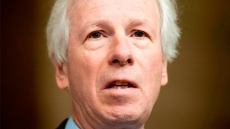OTTAWA — Canadian TV subscribers may be rejoicing as they prepare for Tuesday's launch of new, regulator-mandated basic cable and satellite packages.
But a group that advocates for Canada's broadcasters says consumers will ultimately see fewer channel choices.
And Friends of Canadian Broadcasting says the vast majority of TV viewers will likely see their monthly bills increase under the so-called pick-and-pay system.
Effective March 1, the Canadian Radio-television and Telecommunications Commission is requiring TV service providers to offer customers a basic lineup of channels for no more than $25 per month.
Customers can then top up their channels one at a time, or in small theme packs.
Come Dec. 1, TV companies must offer both options.
The so-called "skinny basic" packages must include at least 10 local or regional channels, as well as educational programming. But even that requirement will disappear once the full pick-and-pay regulation takes effect.
Initially, some consumers who don't watch a lot of TV will benefit, says Friends of Canadian Broadcasting spokesman Ian Morrison.

But eventually, there will be less consumer choice because some channels that are no longer supported through prescription fees will go under, Morrison predicts.
"The end result is that there will be fewer Canadian choices," said Morrison.
"You're starting with choice in the sense of saving a few bucks on your cable/satellite bill, and ending up with fewer Canadian choices."
The bigger TV service providers — Bell, Rogers and Telus — were waiting until March 1 to officially unveil the channels included in their trimmed-down basic packages.
But Shaw Cable, which dominates the TV market in Western Canada, and Quebec's Videotron are already advertising their $25 basic packs on their websites.
Shaw's package, which it calls "Limited TV," features 40 channels, including programming from U.S. networks, ABC, NBC, Fox and PBS. Videotron's basic cable doesn't offer the American channels.
Market research conducted in late 2015 by media analysis consulting firm Nordicity found that only a small percentage of Canadian TV viewers would switch to a smaller basic service over the next few years, once given that choice, broadcast lawyer and consultant Peter Miller said in a recent interview.
"Most Canadians will stick with their current packages because most Canadians do look at multiples of channels," said Miller.
"We estimate that by 2020, 15 per cent of Canadians would pick one of those smaller sets of (TV) packages with the small basic."
Nordicity also estimated that the average consumer would be willing to pay an additional $20 for discretionary channels — either individually or through add-on bundles — on top of the $25 maximum that can be charged for the smaller basic service.
The CRTC said the move toward full pick-and-pay is focused on consumer choice, not on cost of service.
"In a pick-and-pay environment, some channels may be more expensive on an individual basis because they will no longer be cross-subsidized with others in large packages," the regulator said in a statement Monday.
"So prices for certain channels may be higher than expected."
Cross-subsidization happens when service providers offset the costs of carrying more expensive channels with the lower costs of their less-expensive channels by offering them together as a bundle.
Still, the regulator will be monitoring the new pricing models introduced by service providers to ensure consumers aren't being gouged, CRTC chairman Jean-Pierre Blais suggested in a speech last week to a Toronto business audience.
"Cable and satellite companies should not view this change as an opportunity to replace business practices designed to maximize profits from captive customers with newer forms of anti-consumer behaviour," said Blais.

"Instead, I urge them to make the products they sell even better for Canadians, and put viewers — their customers — back in control of their televisions. This is their moment to shine."




